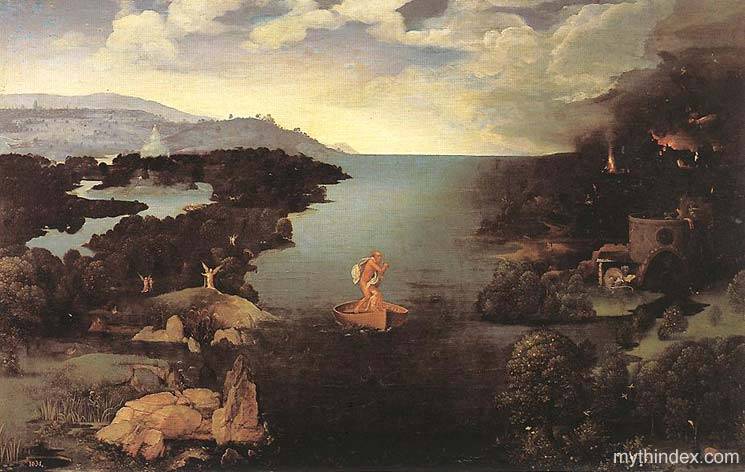Robin Parry is reading Ilaria Ramelli’s massive 900-page volume — The Christian Doctrine of Apokatastasis: A Critical Assessment From the New Testament to Eriugena, which I believe is also Oprah’s Book Club pick this month.
That’s a Gideon title. You remember the story of Gideon? After he musters an army of more than 30,000, God tells him its too big. So he whittles it down, step by step, until eventually only 300 remain.
Academic presses seem to take the same approach to the potential audience for books like Ramelli’s. They’ve got a 900-page manuscript on doctrine in the early church. How big is the potential audience for a book like that? Too big, they decided. So they add a bit of Greek and the name of an obscure medieval theologian. (Eriugena, Wikipedia says, “is best known today” for his translation and commentaries of Pseudo-Dionysius. So now, I’m sure, you’re all thinking, “Oh, yeah, OK — that guy.”)
Ramelli’s subject, though, is actually really interesting. She lays out the popularity and variety of universalism in the early church. As Parry summarizes:
What she demonstrates across the book as a whole is that the roots of universalism go back far earlier than is usually realized — it was not some “out of the blue” invention of Origen — and that universalism was far more widely spread across the early church than is usually realized.
So, even though I realize it wouldn’t do much good to give Ramelli’s book a “catchy” title to snag impulse buyers at the airport bookstand, I might’ve gone with something a little more reader-friendly or provocative. Like, maybe, Restoration: 800 years of Christian Universalism.
Parry’s post gleans lots of examples from the book, citing lots of those delightfully strange early Christian texts that were widely read and revered before (and often after) the canon of the New Testament was settled on.
These examples are immensely encouraging for what they reveal about the character of those early Christians. Many were universalists, but not quite in the way we think of universal salvation today. These early universalists all seemed to assume three things:
1. Unredeemed and unrepentant sinners would be condemned to punishment in the afterlife/underworld. (Their imagery is mainly shaped by Greek and Roman mythology — this was long before Dante, and the modern “Hell” of horror movies and heavy metal album covers hadn’t been dreamed up yet.)
2. Christians would go to heaven, but would be pained by fate of the lost and compelled to pray for them, begging God to have mercy on the souls in torment. All of the redeemed, it was assumed, would be doing this all of the time, ceaselessly, in heaven. After all, they’re good people — not monsters.
3. God would grant those prayers and extend mercy, eventually, to all the lost in a final restoration (or apokatastasis). Because, after all, God isn’t a monster either.

I particularly liked this snippet from the second-century Apocalypse of Peter, which has Jesus, in heaven, saying to Peter: “You will have no more mercy on sinners than I do, for I was crucified because of them.”
That can be read in two very different ways — in two opposite ways. It could be read as Jesus chastising Peter for trying to out-mercy Jesus himself by praying for the damned. Jesus might be saying something there like, “Hey, knock it off. You’re not allowed to have more mercy on those sinners than me. I got crucified because of them and now they’re getting the payback they deserve!”
Or, that could be read as Jesus responding to Peter’s plea by reminding him that Peter’s mercy is only a tiny fragment of the infinite mercy Jesus himself has for everyone — mercy he demonstrated by humbling himself unto death, even death on a cross.
Look again at that ambiguous statement: “You will have no more mercy on sinners than I do, for I was crucified because of them.”
Which way do you think it should be read? Your answer will depend on what you think Jesus is like. Your answer will depend on what you believe about the character of Jesus.
The Apocalypse of Peter quickly clears up the ambiguity of that statement, as it has Jesus then assuring Peter that even the damned will receive divine mercy, “life, glory, and kingdom without end.” That’s what the author(s) of Apocalypse of Peter, writing in the early second century, believed Jesus was like. And, as Ramelli’s book shows, this is what many, many Christians believed Jesus was like throughout the first 800 years of Christianity.
I’m not suggesting here that we treat this passage from this odd little early apocalyptic book as canonical. But the question it raises about the character of Jesus remains, regardless of the source. Do you imagine that you have “more mercy” than Jesus?












